- News
- Reviews
- Bikes
- Components
- Bar tape & grips
- Bottom brackets
- Brake & gear cables
- Brake & STI levers
- Brake pads & spares
- Brakes
- Cassettes & freewheels
- Chains
- Chainsets & chainrings
- Derailleurs - front
- Derailleurs - rear
- Forks
- Gear levers & shifters
- Groupsets
- Handlebars & extensions
- Headsets
- Hubs
- Inner tubes
- Pedals
- Quick releases & skewers
- Saddles
- Seatposts
- Stems
- Wheels
- Tyres
- Tubeless valves
- Accessories
- Accessories - misc
- Computer mounts
- Bags
- Bar ends
- Bike bags & cases
- Bottle cages
- Bottles
- Cameras
- Car racks
- Child seats
- Computers
- Glasses
- GPS units
- Helmets
- Lights - front
- Lights - rear
- Lights - sets
- Locks
- Mirrors
- Mudguards
- Racks
- Pumps & CO2 inflators
- Puncture kits
- Reflectives
- Smart watches
- Stands and racks
- Trailers
- Clothing
- Health, fitness and nutrition
- Tools and workshop
- Miscellaneous
- Buyers Guides
- Features
- Forum
- Recommends
- Podcast
review
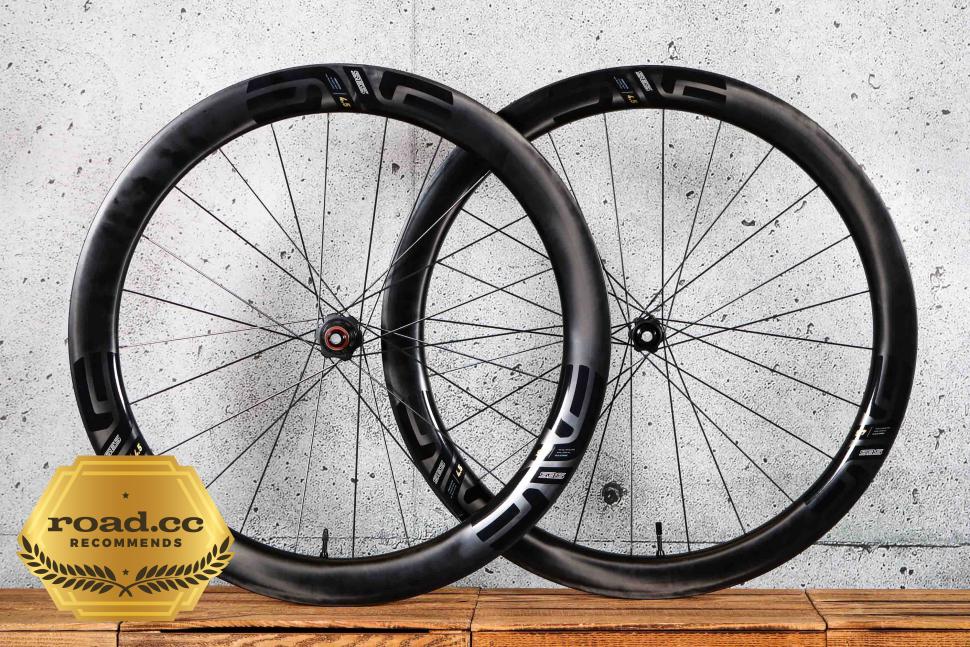 Enve SES 4.5 wheelset
Enve SES 4.5 wheelset£3,350.00
VERDICT:
The best hookless wheels on the market right now – for a price...
Stability
Different depths/profiles front and rear
Speed
Stiff and responsive
Quality build
Hookless will put off some riders
Price
Weight:
1,469g
Contact:

This product has been selected to feature in road.cc recommends. That means it's not just scored well, but we think it stands out as special. Go to road.cc recommends
At road.cc every product is thoroughly tested for as long as it takes to get a proper insight into how well it works. Our reviewers are experienced cyclists that we trust to be objective. While we strive to ensure that opinions expressed are backed up by facts, reviews are by their nature an informed opinion, not a definitive verdict. We don't intentionally try to break anything (except locks) but we do try to look for weak points in any design. The overall score is not just an average of the other scores: it reflects both a product's function and value – with value determined by how a product compares with items of similar spec, quality, and price.
What the road.cc scores meanGood scores are more common than bad, because fortunately good products are more common than bad.
- Exceptional
- Excellent
- Very Good
- Good
- Quite good
- Average
- Not so good
- Poor
- Bad
- Appalling
The Enve SES 4.5 wheelset is designed to be fast everywhere, whether you're climbing, descending or sprinting. In fact, this is the wheelset that Tadej Pogacar used for every road stage on his way to 2024 Tour de France victory. During testing, I've found the wheels to be not only fast, well made and competitively light but also stable and easy to live with. In my opinion, this is the best hookless wheelset on the market right now – as you'd hope, with this price tag...
Enve has an enviable reputation when it comes to carbon wheels and the 4.5 can be seen as something of a hero product, designed to be one wheelset that can do it all. For pure climbing, Enve makes the shallower SES 2.3 and 3.4 wheelsets, and for flat courses there are the deeper 6.7 and 7.8 wheelsets. As the name suggests, the SES 4.5 sits right in the middle with rim depths of 50mm and 56mm front and rear respectively.
As part of Enve's flagship line-up, the SES (Smart Enve System) wheels are said to not only get the stamp of aerodynamic approval but also 'stability and a holistic approach of how the product interacts with both the bike and rider'.
Wider than wide
Pulling the wheels out of the box, the first thing you notice is just how wide the rims are. Wheels have been getting wider and wider in recent years, but the Enves take this one step further with an internal width of 25mm. For reference, the Zipp 454 NSWs are still considered wide at 23mm internally, and many pro-level wheels still feature 21mm internals, such as the Roval Rapide CLX ii.
Both rims measure 32mm externally at their widest point but differ in their profiles. This has long been a trait of Enve wheels, with a shallower U-shaped rim at the front and a deeper, more V-shaped profile at the rear. Personally, I really like this approach. I think it enables riders to benefit from a deeper, more aero rim without the usual drawbacks in windy conditions – a deeper V-shaped rim at the front would be less stable and harder to control, so this is like the best of both worlds: aero at the back, stable at the front. In fact, many of my favourite wheelsets from the likes of Roval and Hunt follow this same strategy.
According to Enve, the external width has been aero-optimised for the Enve SES 29mm tyre; that's wider than many of its competitors, who can still be found optimising their rims around 25 and 26mm tyres. Multiple brands have told us that for maximum aerodynamic performance and stability, the wheel at its widest point should be around 105% of the tyre width, backing up the fact that these should work well with 28-30mm tyres.
For me, that's perfect for UK riding. I've slowly but surely upped the width of the rubber that I use, now choosing 28mm tyres for racing and 30 or 32mm for training. During the testing period, I fitted several pairs of tyres but settled on a set of 30mm Continental GP5000 S TRs, the same setup as Pogacar has been using this season. Thanks to the width of the rim they don't balloon, and the transition between rim and tyre is very smooth.
I received the wheels taped, and tubeless valves are supplied – in the fanciest pencil case you've ever seen! – with valve caps that double as valve core removers, which is a nice touch.
In each and every case of fitting tyres (four sets in total), I was seriously impressed. The tyres didn't exactly fall onto the rim but needed only a little persuasion, and required no more than a track pump to inflate. If only tubeless installation was always this easy!
Age-old hookless debate
I glanced over the fact earlier that the rims are hookless. This is sure to put some riders off, and while we've come a long way in a relatively short amount of time, this does still limit tyre compatibility.
For example, Enve says not to use the rims with anything narrower than a 27mm tyre, the tyres should be tubeless ready (these are usually more expensive), ISO tells you not to use anything narrower than 29mm on a 25mm internal rim, and the Goodyear Eagle F1 and Panaracer Agilist tubeless tyres that I had lying about don't feature on Enve's compatibility chart.
Although you won't be spoilt for choice, there are plenty of top tyre options that are compatible – Continental GP5000 S TRs, various Vittoria Corsas, Schwalbe Pro Ones, Michelin Power Roads and Specialized S-Works Turbo RapidAirs, to name just a few, all get the green light.
I am also still on the fence when it comes to the advantages of hookless. Yes, it enables a lighter and simpler rim, and should allow for a higher strength-to-weight ratio, but we've all seen the high-profile incidents, and there's no getting away from the fact that brands will like that they're cheaper to manufacture. One thing for sure is that Enve takes hookless safety very seriously, and I find it reassuring to know that Team UAE and Total Energies have been using these wheels for the last few seasons without issue. The pros put an insane amount of miles in and will push their wheels and tyres far harder than I ever could; if they'd had issues, we'd have seen them.
Weight
The hookless rims have undoubtedly been used to save weight, and on the road.cc Scales of Truth, the 4.5s weighed in at 1,469g with tape fitted and an XDR freehub. That's competitive for wheels of this depth; the Roval Rapide CLX ii wheels (£2,250), for example, are a claimed 1,520g (we reviewed the lower tier CL ii wheels with exactly the same rims).
The Zipp 454 NSWs mentioned earlier are lighter, though, at 1,420g, likely helped by the narrower rims requiring less material. But the Hunt 48 Limitless wheels that took the top spot in our recent best road bike wheels buyer's guide weigh significantly more – 1,690g – despite being shallower.
> Buyer’s Guide: Best road bike wheels
I've said it before and I'll say it again: low weight is by no means the be-all and end-all when it comes to wheel performance but the Enves are light enough that you won't be disadvantaged on climbs and they feel fast to accelerate, but if you're looking for a weight-weenie wheelset there are lighter options out there.
Spokes and hubs
You might be reading this review thinking that we're a bit late to the party – haven't the SES 4.5s been out since 2022? Well, not with these hubs they haven't; our review set is one of the first to be built up on these new Enve hubs in the UK, courtesy of Saddleback.
Enve has completely overhauled its hub design with this latest 'Innerdrive' design, featuring oversized ratchets, threaded end caps for preload adjustment and the ability to lace a wheel with just one length of the spoke – that promises to make keeping spares just a little bit easier.
In use the hubs have been faultless. I've been pressure washing (to try to speed up the weathering process), riding through potholes and generally abusing the wheels and they still run as true and smoothly as the day they arrived – which is to say, very true and smooth!
I've also disassembled the hubs and the servicing promises to be simple. There are relatively few parts in the hub, and fewer parts means less to go wrong. The other interesting thing about the hubs is that they're available with 40, 60, 80 and 100T ratchet rings, more than anyone could ever want for road use. The wheels ship with the 40T ratchet, which results in near-instantaneous pickup, though Enve did let on that some pro sprinters prefer a 60T ratchet for an even smaller engagement angle.
As for the 80T and 100T options, I can't see them ever being necessary in a road environment, but I would love to hear what noise they make while freewheeling!
Speaking of freehub noise, the Enves aren't quiet, producing a high-frequency buzz similar to that of Chris King hubs when freewheeling. You can, of course, mute most freehubs with grease if this isn't to your taste.
The wheels are laced with 24 spokes both front and rear; that's a few more at the front than many performance wheelsets, especially those reaching for lower weights. Enve says that the 4.5s were 'originally designed for the cobbles and crosswinds of Paris-Roubaix to provide an aero benefit with high-volume tyres' and this gives some indication as to the motivation behind that spoke count. Considering the width of the rims and this added spoke count, it's impressive that the Enves are as light as they are.
At a quick glance, the Enves do look similar to just about every other carbon wheel on the market, but the more you research them, the more you notice the unrivalled attention to detail. Take the spoke holes, for example – they're moulded rather than drilled, with each one claiming to be able to withstand over 700lb of pull before failure; the holes are designed to prevent the spokes from twisting, to preserve spoke tension; every wheel is laced by hand and the spokes have a small gap between them where they cross to ensure that they never creak.
It sounds simple, but it's this attention to detail that sets them apart from cheaper wheelsets. As part of the review process I actively try to find faults with whatever I am reviewing – and when it comes to wheels usually do! – but after three months of testing, the 4.5s haven't missed a beat.
Ride feel
Out on the road, the Enves performed exceptionally. They feel laterally stiff, they feel fast on flat roads and they're incredibly stable – more stable than many wheels that are significantly shallower, in fact. During the three-month testing period there has been no shortage of windy days, sideways rain and typically British conditions, but at no point have I felt it necessary to switch to something shallower; these truly have been a fit-and-forget solution to going fast (you will still need the legs).
Although my level of racing is somewhat below what the 4.5s are used to, I have been taking to the start line using these wheels, which isn't always the case with sets I'm reviewing.
I'm well aware that the difference between wheels is small, but I will always fit those that I think will give me the biggest possible advantage. Usually, this is a set of Roval Rapide CLX wheels with latex inner tubes for flat to rolling races, and a set of carbon-spoke Scribe Elan 40s for hillier parcours. For the Enves to dislodge either of these wheelsets is impressive, but for them to be more than capable in both scenarios is the highest praise I can give the wheels.
The 50 and 56mm rim depths are, I think, perfect; they never feel out of place, whether on a hill climb or bunch sprint at the end of a flat crit, and the stability means you can focus on getting the power down or nailing those lines through the corners without having a 'snap' in the back of your mind.
Unfortunately at road.cc we do not own a wind tunnel so it's impossible for me to say exactly how fast these wheels are, but I am confident that they are right up there with the best, and you know you're doing something right when a competitor (Hunt) publishes graphs showing the wheels to be this quick!
Value
The wheels' performance is class-leading, but how does the astronomical price tag stack up against the competition?
Well, as you probably already know there are some absolutely great wheels for a lot, lot less. The Hunt 48 Limitless wheels mentioned earlier, for example, have now been superseded by the Sub50 Limitless, which start at £1,479.
The Enves aren't winning any prizes for value for money then, but compared with other über-premium wheelsets the price is where you would expect it to be. The Zipp 454 NSWs, for example, have an almost identical price tag of £3,376; they're slightly lighter than the Enves but aren't as stable and our review set didn't feel as well made.
I also had the pleasure of using the Princeton Carbonworks Peak 4550 Evolution wheelset, which were very good but not as stable or as fast on the flat as the Enves. They also blow the price of just about every other wheelset out of the water at £4,899.99...
Top-end components always come with diminishing performance gains, and unless you're very, very serious about marginal gains it's impossible to justify the price on performance alone. Realistically, a lot of the price tag is paying for the research and development costs and that big Enve logo on the side, but if I did have just over three grand (that had to be spent on road bike wheels) burning a hole in my pocket then this is where my money would go.
Another plus point for the Enves is their "incidental damage protection'. As long as you register the wheels within 60 days of purchase, they will be protected against accidental damage whether that's racing, riding or other mishaps, such as on the roof of a car. Within three years of purchase, this includes free replacement rims and/or hubs (buyer to pay shipping and labour), 50% off in year three, 40% off in year four, and 30% off thereafter. It's also worth noting that a second owner can benefit from this. This should give a bit of peace of mind if you do make this very expensive purchase.
Conclusion
Carbon wheels have seen some rapid development since disc brakes became mainstream – they've been getting wider, they've been optimised for larger tyres, they've got faster and they've got more stable. The Enve SES 4.5s turn this up one notch further and I'm pretty confident that this is what most carbon wheels will look like in a few years' time.
The performance is exceptional and every detail has been meticulously analysed. For me, they're the perfect depth, perfectly made, optimised for the right size of tyre and as fast as the best in the business without sacrificing durability or robustness.
If you're looking for the one ultimate road bike wheelset and aren't put off by hookless then these are the wheels to go for. It's no wonder they're the choice of Pogacar.
Verdict
The best hookless wheels on the market right now – for a price...
road.cc test report
Make and model: Enve SES 4.5
Size tested: 700C XDR
Tell us what the wheel is for and who it's aimed at. What do the manufacturers say about it? How does that compare to your own feelings about it?
Enve says: "Go anywhere, fast. The original, modern tubeless road wheel was the first of its kind to pair the rolling efficiency of high volume with world-class aerodynamics." I agree that they're great wheels for just about every road scenario, they're well made and undeniably fast. This speed doesn't come cheap, though.
Tell us some more about the technical aspects of the wheel?
From Enve:
1,452g wheelset (ENVE Innerdrive Premium hub w/XDR driver)
Wide hookless bead, anti-pinch flat technology
25mm internal rim width
50mm deep front rim/56mm deep rear rim
With ENVE's patented moulded spoke hole technology
Aero-optimised for the ENVE SES 29mm tyre
Tubeless-compatible only, hookless construction, may run inner tubes with tubeless tyre
Handcrafted at ENVE's HQ in Ogden, Utah, USA
5-year Factory Limited Warranty, cover through ENVE's Incidental Damage Protection Programme
Rate the wheel for quality of construction:
9/10
Rate the wheel for performance:
9/10
Rate the wheel for durability:
9/10
No issues. The wheels appear very well made, the hubs are a simple design with oversized everything which should aid durability.
Rate the wheel for weight
8/10
Competitive considering the width/depth and spoke count.
Rate the wheel for value:
5/10
These are a money-no-object product – you pay a premium for the best of the best.
Did the wheels stay true? Any issues with spoke tension?
Stayed true, no issues.
How easy did you find it to fit tyres?
No issues at all; tyres fitted as easily as tubeless tyres ever have and I pumped up multiple sets with just a track pump.
How did the wheel extras (eg skewers and rim tape) perform?
No issues, the rim tape worked as it should with no peeling up around the edges. You also get tubeless valves with a valve core remover valve cap and some stickers...
Tell us how the wheel performed overall when used for its designed purpose
Perfectly. Enve says, "When speed across most any terrain is priority number one, look no further than the SES 4.5." That sums up the wheels well; they were fast on the flats when aero is important, up climbs when weight is, on descents when stability was required, and in sprints when stiffness was needed. They manage this without compromising on durability or robustness.
Tell us what you particularly liked about the wheel
They're good everywhere! Flats, sprints, climbing, rough stuff... it never feels like you're on the wrong wheelset.
Tell us what you particularly disliked about the wheel
The price – you can get some quite nice bikes for the same!
How does the price compare to that of similar products in the market, including ones recently tested on road.cc?
As mentioned in the review, these aren't winning any value-for-money prizes. They are, however, on a par with other über-premium wheelsets: the price is near identical to the Zipp 454 NSW wheelset, for example. They are cheaper than the Princeton Carbonworks 4550 Evolution wheelset that we recently reviewed, but more expensive than the tubeless Roval Rapide CLX ii (£2,500).
Did you enjoy using the wheel? Yes
Would you consider buying the wheel? Yes
Would you recommend the wheel to a friend? Yes
Use this box to explain your overall score
I've been searching for four years to find a wheelset that would make me leave the Roval Rapides at home, and I've finally found it! The wheel depths are perfect, they're right up there with the fastest road wheelset on the flats and yet won't hold you back on the climbs, they're optimised around properly wide tyres and they're extremely well made. If you have the money, it's an excellent wheelset.
About the tester
Age: 23
I usually ride: Specialized venge pro 2019 My best bike is:
I've been riding for: Under 5 years I ride: Every day I would class myself as: Expert
I regularly do the following types of riding: road racing, time trialling, cyclo cross, commuting, club rides, sportives, general fitness riding, mtb,
Jamie has been riding bikes since a tender age but really caught the bug for racing and reviewing whilst studying towards a master's in Mechanical engineering at Swansea University. Having graduated, he decided he really quite liked working with bikes and is now a full-time addition to the road.cc team. When not writing about tech news or working on the Youtube channel, you can still find him racing local crits trying to cling on to his cat 2 licence...and missing every break going...
Latest Comments
- Robert Hardy 2 sec ago
High grade components though are often less durable than much cheaper alternatives, just lighter and possibly a little slicker.
- Aluminium can 2 hours 12 min ago
Frame weight is about a hundred grams less than a CAAD 12 disc, which can be picked up cheap these days on gumtree. Heck, get the CAAD12 non disc...
- Dnnnnnn 6 hours 6 min ago
You're too kind. They just seem to be unpleasant trolls.
- ktache 6 hours 48 min ago
I realised that the lads crash is a rare set of circumstances, and the numbers in the race would add complexity, but don't smart watches have...
- Jogle 7 hours 1 min ago
And in Southampton today we had another example of those entitled ambulances going through red lights without a care for anyone else!...
- TheBillder 8 hours 15 min ago
The spokes and nipples are not anodised for environmental reasons, but the rims are. Which is a lot more metal. Hmm...
- Zebulebu 8 hours 48 min ago
Yeah, they'll be great after being crushed in your jersey pocket for three hours. ...
- Rendel Harris 8 hours 55 min ago
I'm afraid so, anything operated by TfL apart from the Woolwich ferry and the Silvertown Tunnel bike bus when it opens next month.
- Backladder 10 hours 2 min ago
Its only "meh" because we all experience similar passes every ride, I'm sure if they got their finger out and worked out the distance it would be...
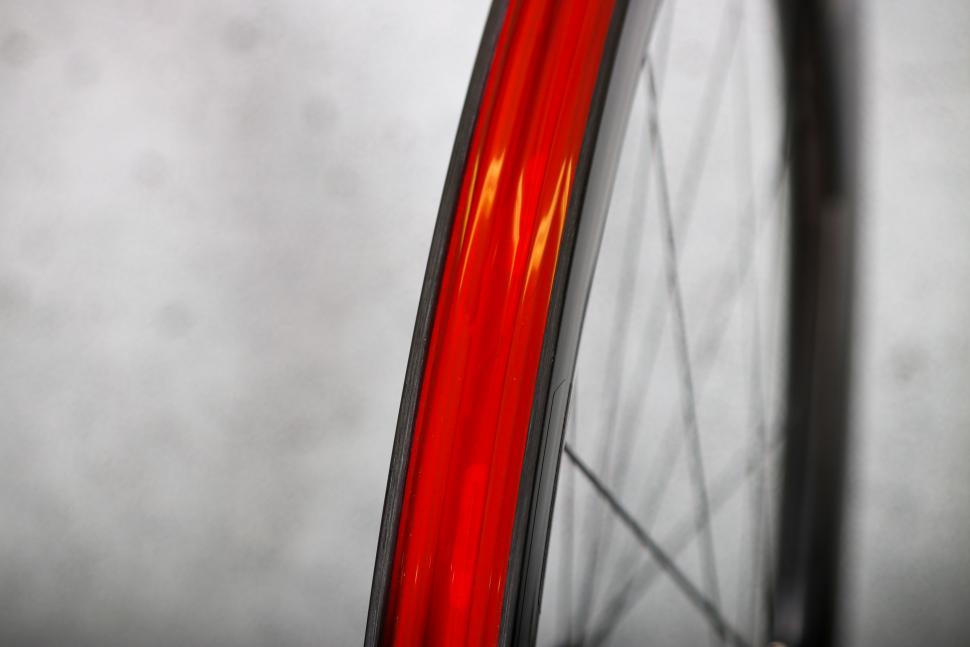
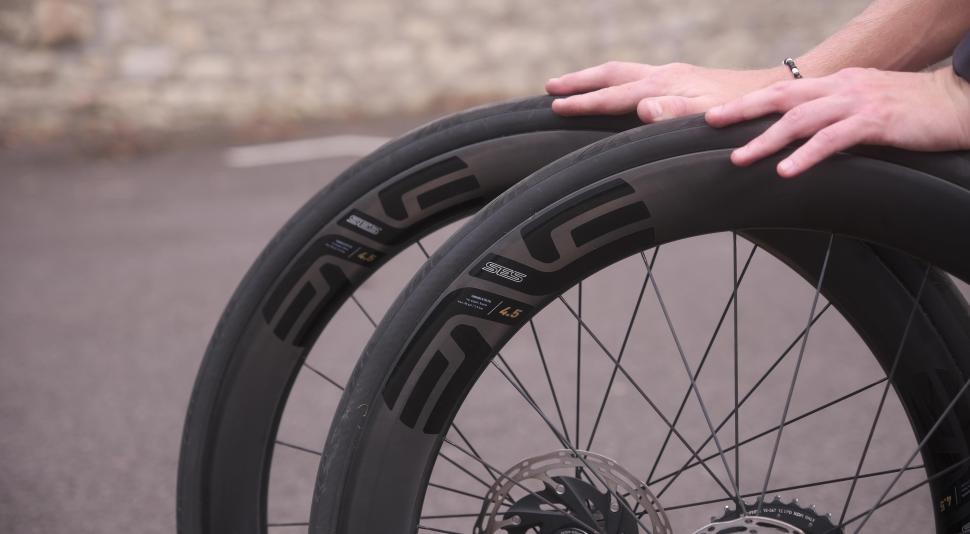
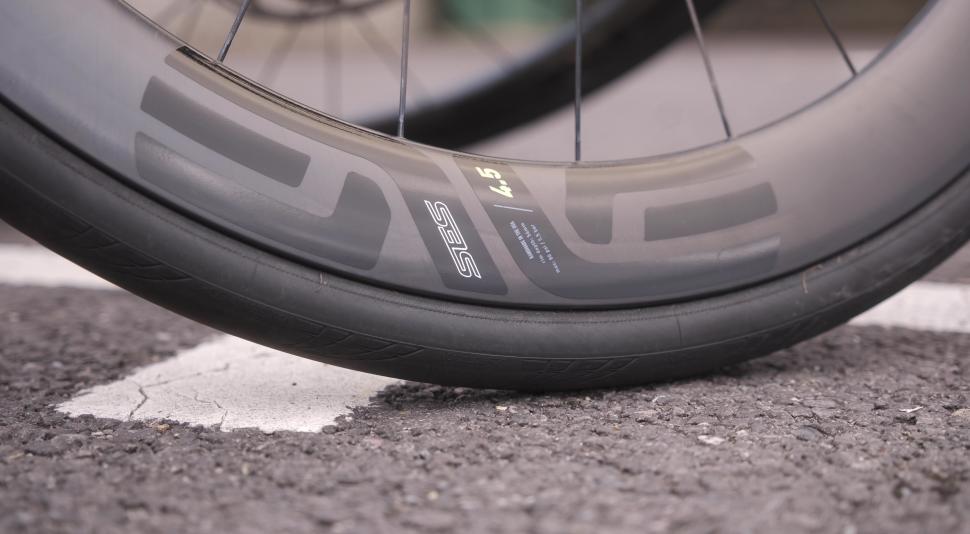
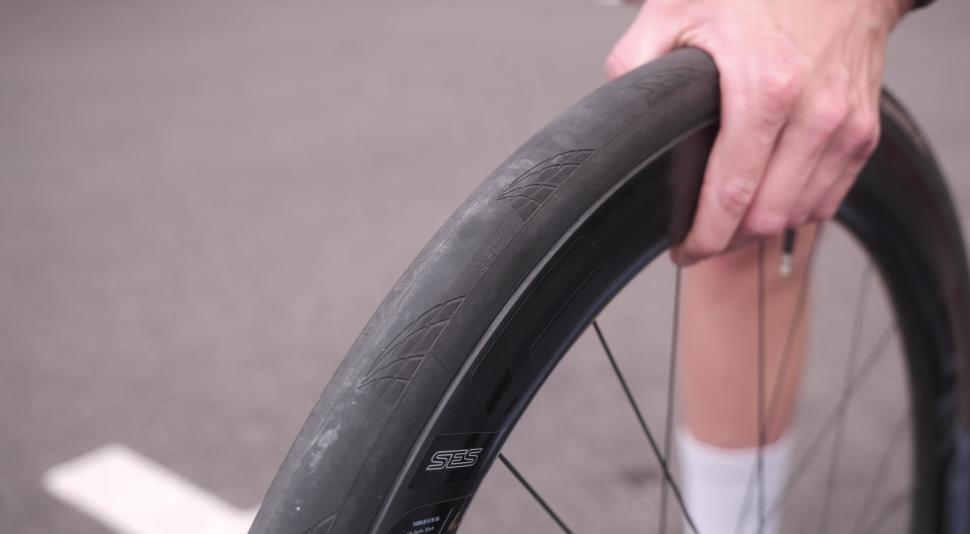
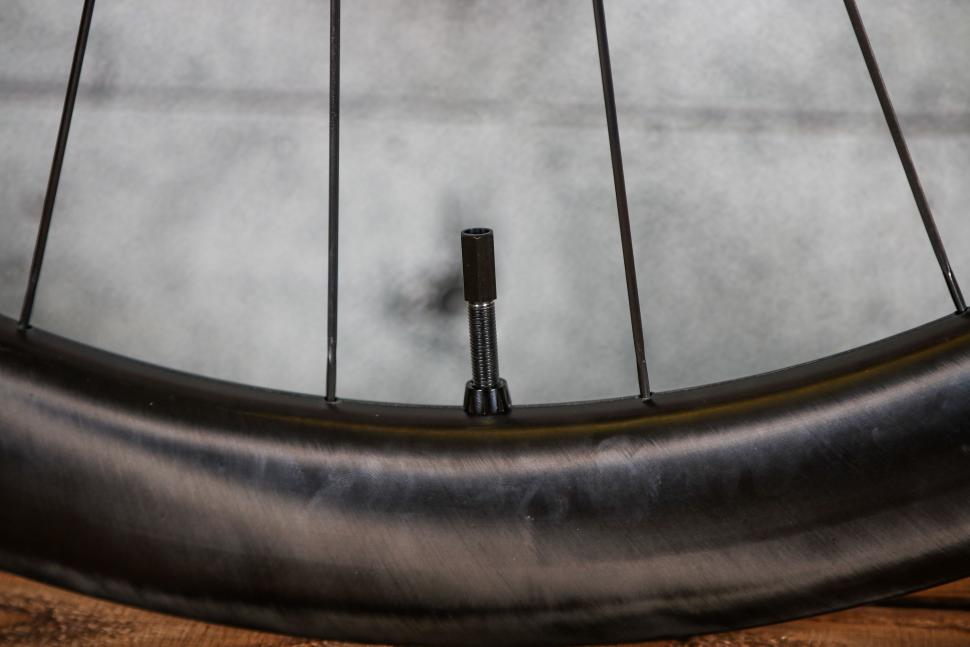
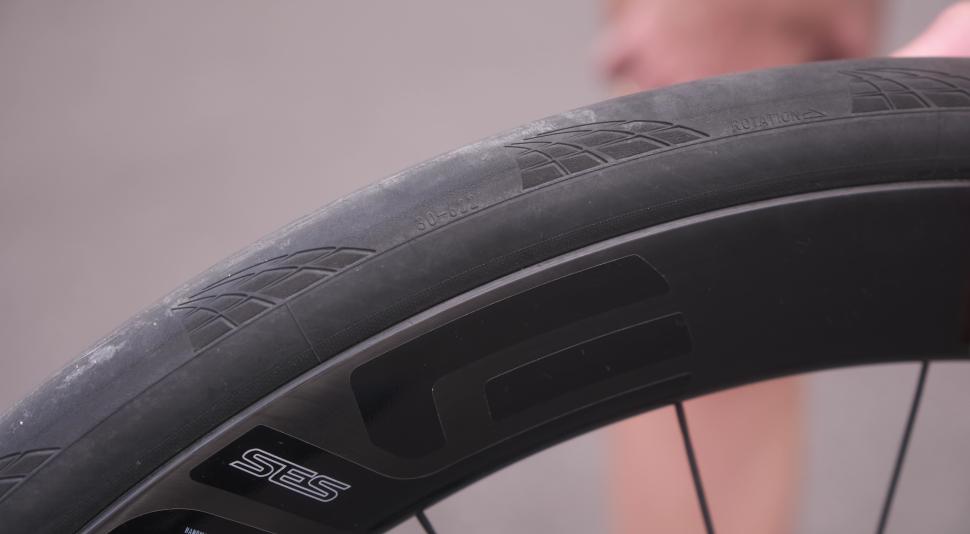
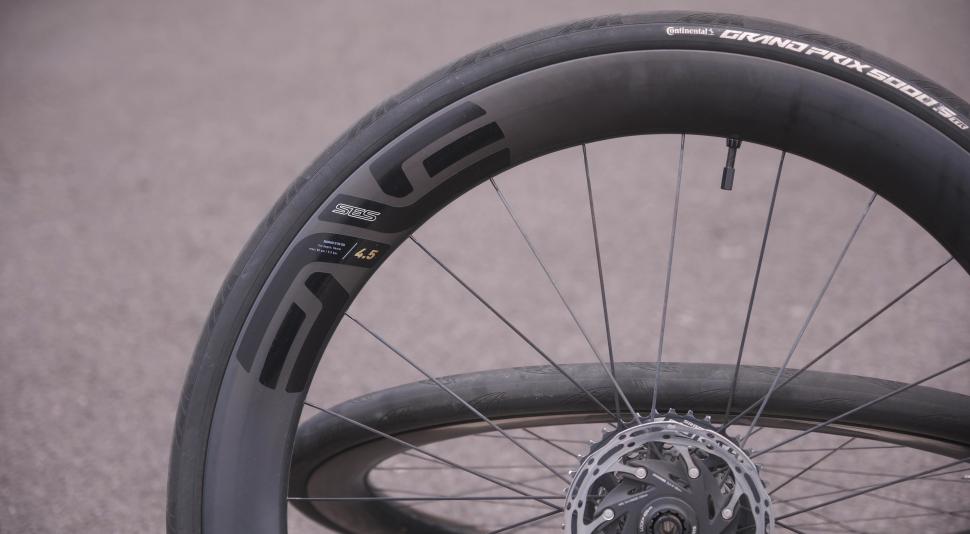
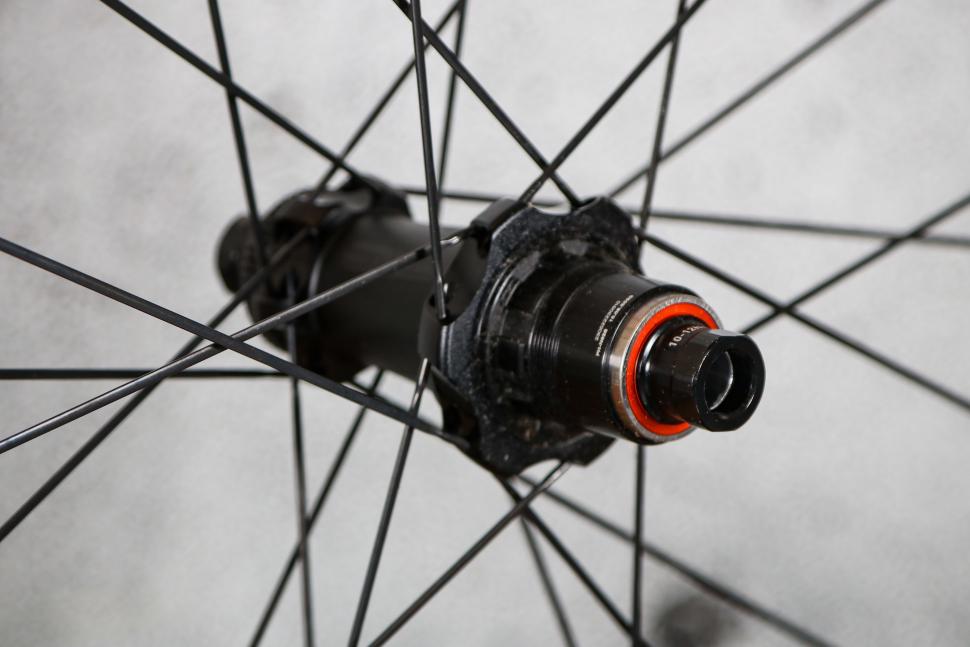
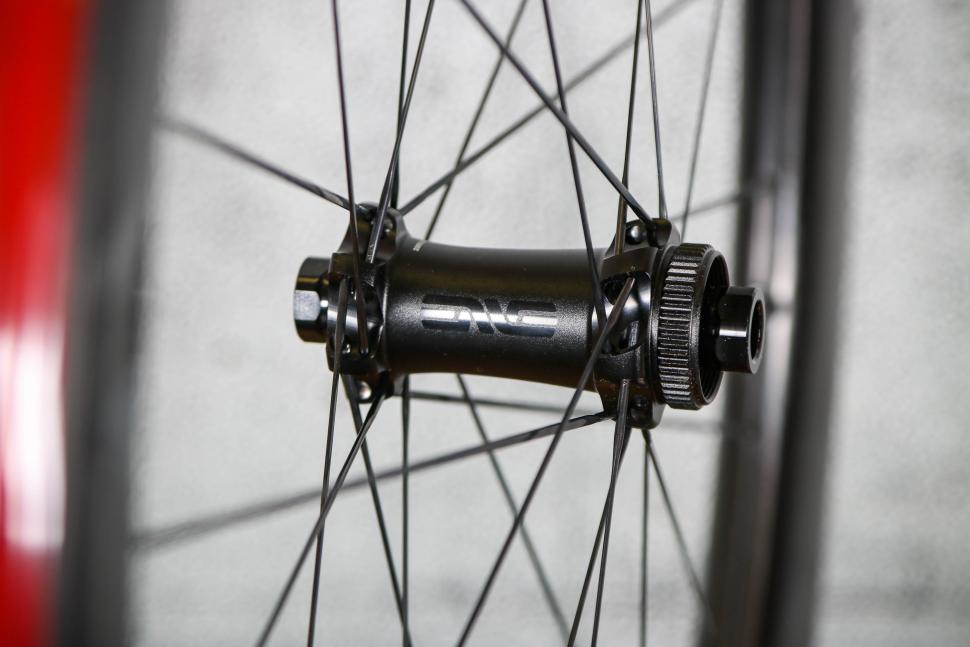
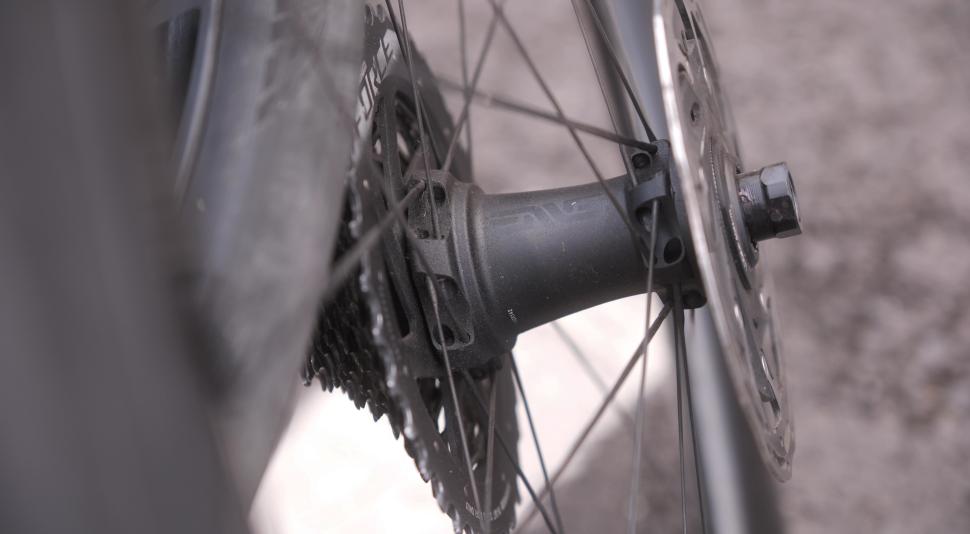
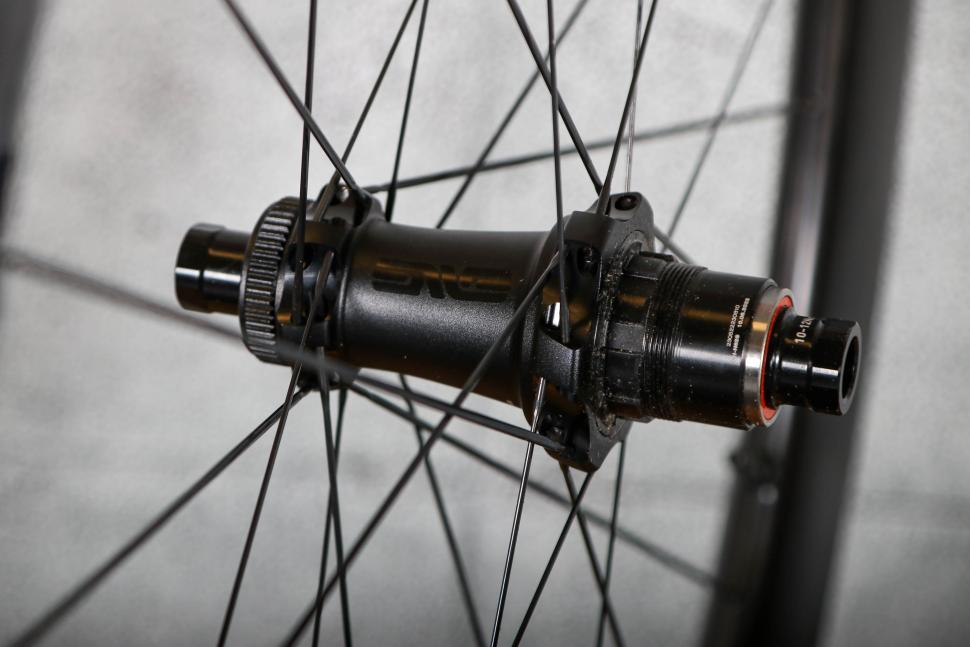

















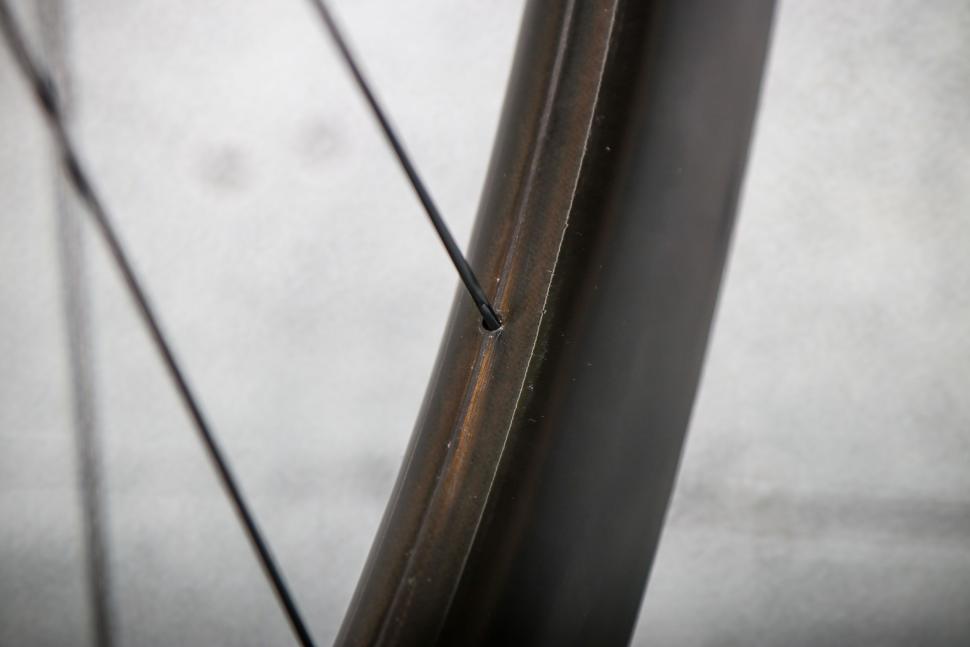
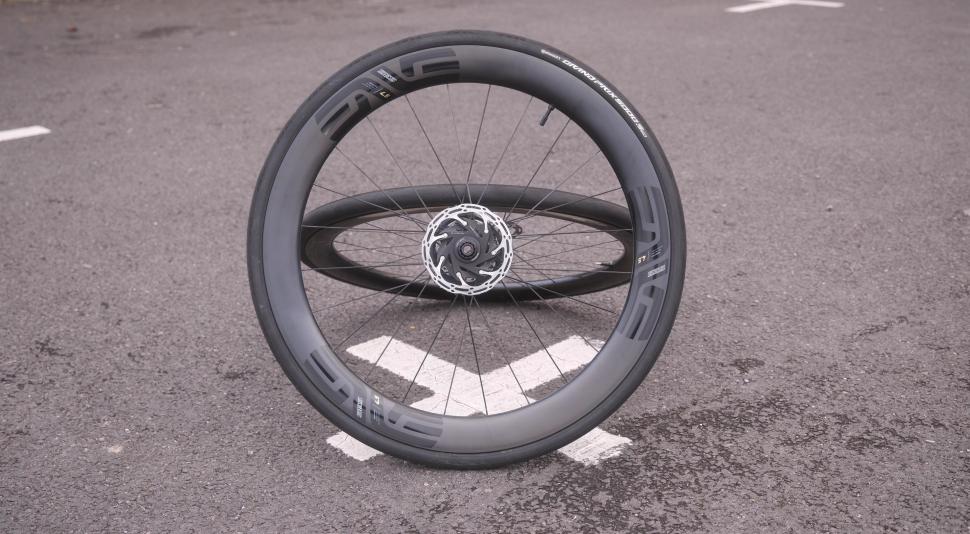
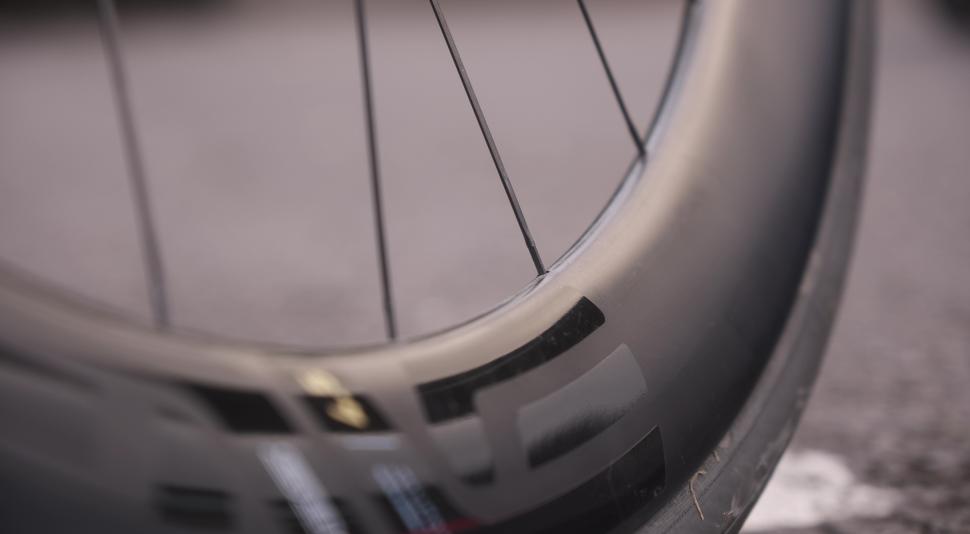
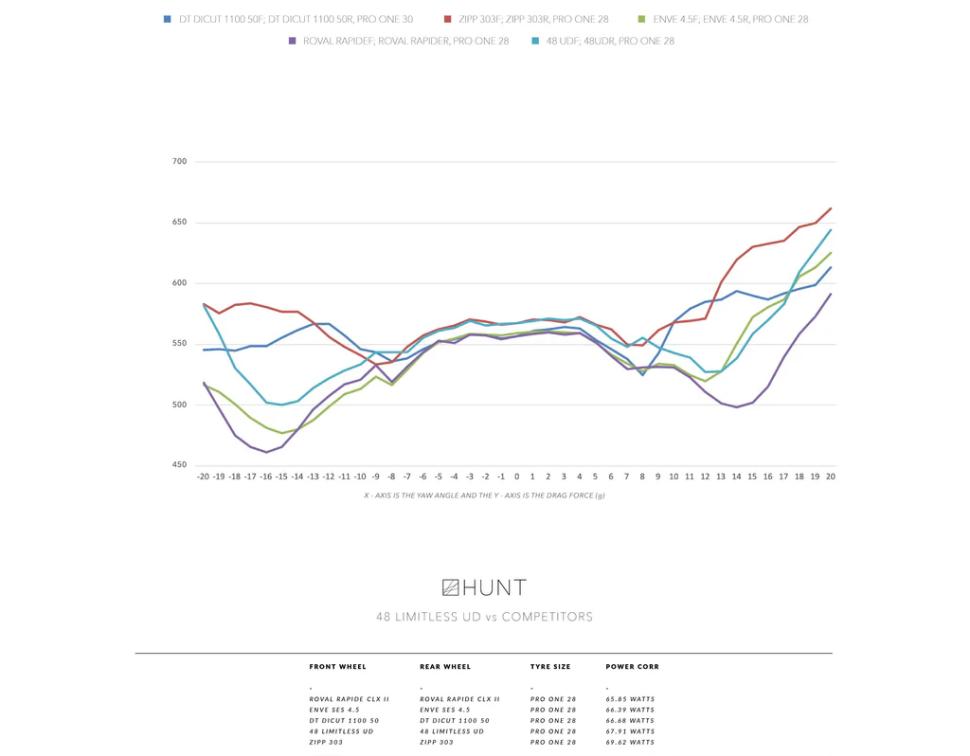
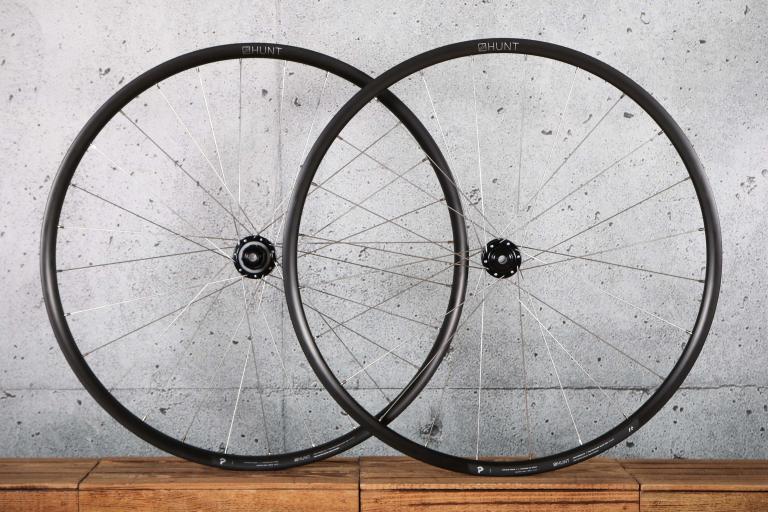
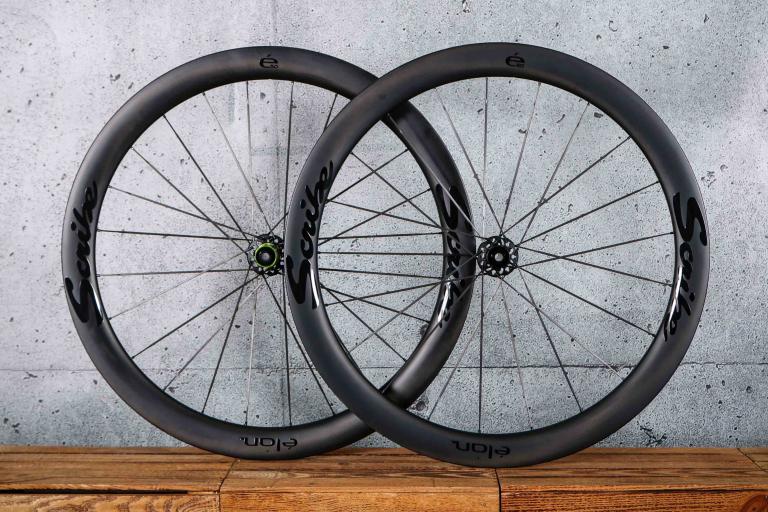
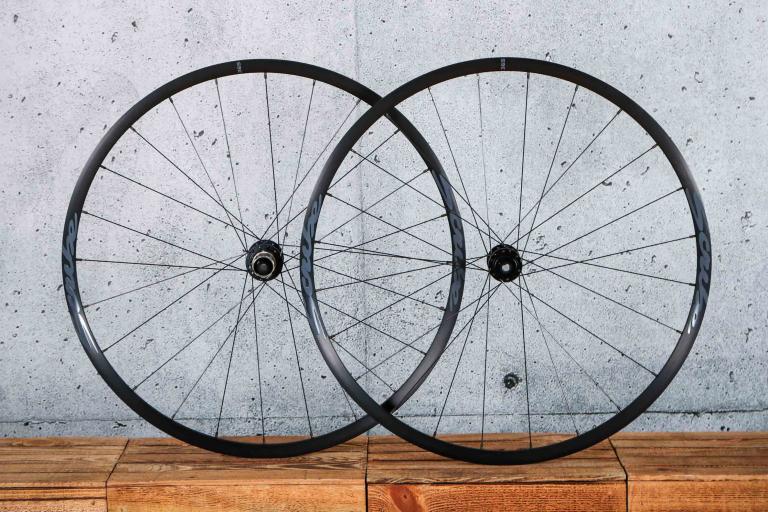
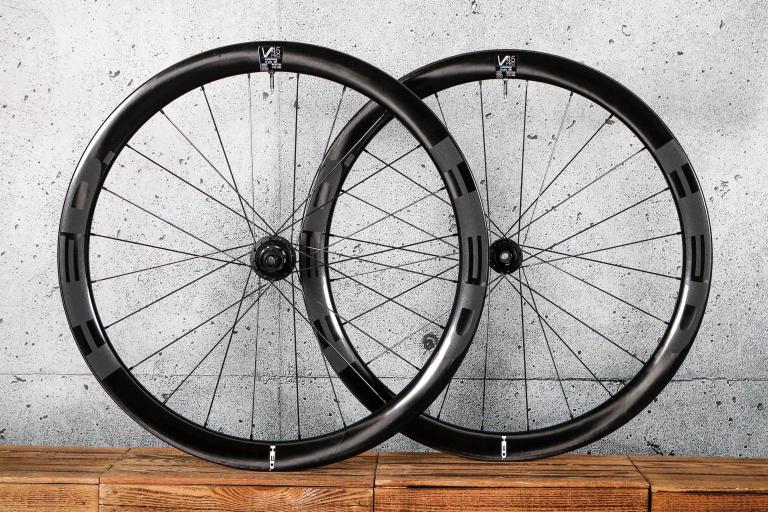
Add new comment
15 comments
I got mine a few months ago and ride them with the Enve 31mm SES Road tire with a tubeless sealant setup. On the tire, the width is similar to what the author above stated. I ride them on the recommended 53psi for my weight/tire combo and it feels as firm as the 25mm on 25external width mavic's I had on the last bike. The enve tire has been flush with the rim with no balloon. No issues with it, but next set I may try the continental 5000GP as those have always been the go to. I had some apprehensions about tubeless before, but have realized that the problems that would send you home walking on tubeless would generally do the same on a tubed setup. If the hole/tear is too big for a patch, dart, or sealant, then that kind of failure would generally send you home walking anyway. For hookless, I haven't run into any issues yet and I pump to recommended pressures before every ride. There are small digital guages like Schwalb Airmax (and smaller ones too) if say you wanted exact pressure, but you get a general feel for the pinch of what it should be that should be accurate to 20PSI. I've really enjoyed the setup and it's certainly had comfort, handling, climbing, and descending benefits.
'Hookless will put off some riders'. IMO, this should really read 'Hookless should put off most riders'. I can't think of a reason where hookless offers something to the consumer over hooked. In addition to the points already made - tire choice, safety issues, there's clearly none of the supposed cost benefit to the manufacturer being passed on, and the restrictions around tire pressure are equally disadvantageous. Circa 72 psi might be an appropriate pressure for a pro who weighs 60 - 70 kilos, but if you're a 90 - 100 kilo rider, 70 psi will increase puncture risk, and massively increase rolling resistance. I also don't buy the 'pros ride them much more than us, so therefore they must be okay' argument. Yes, pros put out lots more watts than the average rider, but they are also much lighter than most of us, much more skilled than most of us, and benefit from multiple wheelsets and wheel systems set up by pro mechanics. Hookless is a standard foisted on the consumer by manufacturers for reasons solely related to cost, and should be called out as such.
Elite 50d cost 1/3 of this tyre, are also wide inside and weigh less. Why would anyone opt for hookless if there are options that have the same or lower weight and cost less?
I would have loved to see a set of Reserve wheels included. These also have a mini-hook, making them a whole lot more safe.
Of course, you cannot test, let alone obtain, every wheelset.
We'll see if we can get a set in
Thank you!
I have them since last year on my Cannondale SSE4 52/63 relaced with tactic hubs (1440gr including rimtape). Best wheels I ever had. Run them with TPU inners and 28mm tires (Pirelli P Zero). Why ride tubeless if tires have less thread (30% less) making RR lower, are a lot heavier, much more difficult to fit etc ... Running with TPU at 4.7 bar at the back gives you the same comfort and same RR without hassle of heavier tires and sealant ... The tubeless mantra is always lower RR which is FAKE as they the thread thickness determines a lot the RR and also wear out much faster, are heavier ...
My upcoming factor will get Duke 56mm wheels 23/29.6 with tactic hubs weighing only 1290gr including rimtape. Fit the new AR version 33wide and 25 iw will give you 1340 max for a lot less ...
Road.cc did a test of Reserve wheels, albeit not the same rim depth.
https://road.cc/content/review/reserve-4044-wheelset-306089
I don't want hookless, in the same way I have so far avoided tubeless for my road bike. Tyre selection is a minefield.
My local bike shop has a bucket full of broken Enve rear hubs. Love to see a long term test.
I'm not buying hookless. It's only advantage is cheaper to manufacture. That doesn't do anything for me. Tire and psi compatibility charts being required is ridiculous.
The other advantages are lower weight and less chance on snake-bites. The hughe disadvantage is safety, unless you stick to tire recommendations of the manufacturer. Or perhaps if you really know what you are doing.
Well I ride reserve wheels and bigger tires give you less snake bites. I use the normal tpu inners and omly had a snakebite in Spain hitting a very sharp stone on a descent. Pressure on my wheels are 4.3 front and 4.6 back bar
I run Duke wheels too laced to tactic hubs 56mm high 1290gr including rim tape. The weight saving which is a few gram you loose ALL in heavier tires. A tubeless tire with the same thread thickness as a clincher run 80+gr per tire more ! Only the TT type things are close to a clincher weight
Rr is also fake as it's a lot caused by using std butyl inners and low thickness on tubeless tires. Tpu inners are almost equal in rr and weigh next to nothing (same a sealant)
oh forgot fixing a gash makes you walk home on tubeless. In a clincher you just put a small cut piece of an old tire where the gash is or some Parktool outer patch. Been there done that
Without a pressure gauge on your pump or CO2 inflator how do you ensure the correct pressure after a puncture or are you expected to call a taxi to get you home?
Feel, using your other tyre as a comparison? It won't be perfect but probably good enough to keep you out of any danger.